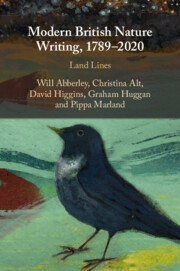Introduction
Published online by Cambridge University Press: 10 March 2022
Summary
British nature writing is a conflict-ridden mode that speaks to contradictions in the modern condition, and a crisis-ridden mode that addresses the modern crises of the environment, of representation and of the alienated self. It returns repeatedly to problems of mimesis and the non-transparency of language, and to the slippages between ecological facts and the cultural imagination. ‘Nature writing’ is a problematic category, and classifications of earlier literature as such must be qualified, recognising the historical overlapping of environmental literature with natural history and other genres. Although British nature writing grew in dialogue with its American equivalent, it has always been less concerned than the latter with the wilderness, addressing more cultivated environments in which wildlife intermingles with human social and economic activity. The genre has long sought spiritual renewal and significance in wildlife and engaged in conservation movements, although its environmentalist ethics have not been consistent. British nature writing has also been deeply shaped by the pastoral and georgic traditions, causing it to waver between the foci of leisurely contemplation and laborious activity.
Keywords
- Type
- Chapter
- Information
- Modern British Nature Writing, 1789–2020Land Lines, pp. 1 - 30Publisher: Cambridge University PressPrint publication year: 2022



